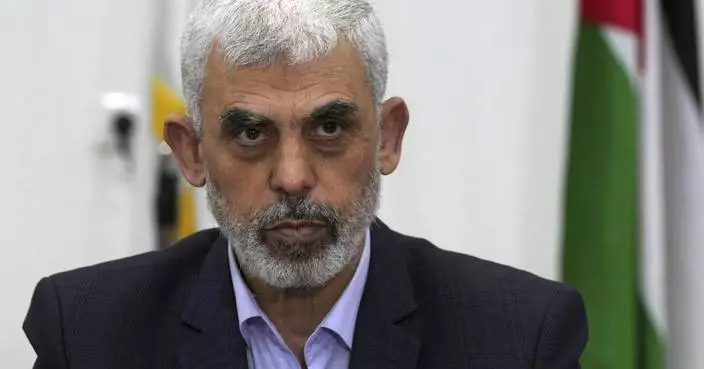OKLAHOMA CITY (AP) — An Afghan man who is accused of plotting an Election Day attack in the U.S. was ordered Thursday to remain in custody as officials disclosed that he had previously worked as a security guard for an American military installation in Afghanistan.
U.S. Magistrate Judge Suzanne Mitchell in Oklahoma City issued her ruling after hearing testimony from an FBI special agent that Nasir Ahmad Tawhedi, 27, of Oklahoma City, and his brother-in-law, a juvenile, took steps to obtain AK-47 rifles and ammunition and planned to carry out an attack targeting large crowds on Election Day next month. Mitchell also determined there was probable cause to bind Tawhedi over for trial.
FBI agent Derek Wiley testified that Tawhedi also is linked to an investigation in France that led to the arrests this month of three people, including two of Tawhedi's brothers, who authorities say were plotting a terrorist attack in that country. One of those arrested in France, a 22-year-old Afghan who had residency papers in France, was being investigated for a suspected plan to attack people in a soccer stadium or shopping center.
Authorities say both Tawhedi and those arrested in France were inspired by Islamic State ideology.
The Justice Department said earlier that Tahwedi had entered the U.S. on a special immigrant visa in September 2021 shortly after Afghanistan’s capital city of Kabul was captured by the Taliban, and had been on parole pending a determination of his immigration status. In court Thursday, Assistant U.S. Attorney Matthew Dillon told the judge that Tawhedi had been temporarily allowed into the U.S. while he had a pending application for resident status, but that his parole status has since been revoked.
“Were he to be released today, he would be unlawfully in the United States,” Dillon said.
Tawhedi, bearded and with dark tousled hair, was led into the courtroom with his hands shackled around his waist and flanked by two U.S. marshals. Both he and his attorney, Craig Hoehns, wore a headset to communicate, and a Dari language interpreter was provided by the court.
Wiley testified that Tawhedi had been under observation by federal agents for more than 40 days before his arrest on Oct. 7. He said Tawhedi subsequently admitted to investigators that he and his co-conspirator planned their attack to coincide with Election Day next month and that they expected to die as martyrs in the attack.
Wiley said Tawhedi had used the online messaging application Telegram to communicate with an account associated with the Islamic State militant organization that was directing his actions, and that Tawhedi had sworn allegiance to the group and “would do whatever they told him to.”
In arguing for home detention while awaiting trial, Hoehns suggested that the only weapon Tawhedi ever handled in the U.S. was given to him by a government informant and that Tawhedi had never been arrested or even received a traffic citation in three years in the U.S.
Hoehns said Tawhedi had worked previously as a rideshare driver in Dallas and at several oil change locations in Oklahoma City.
France’s national anti-terrorism prosecution office has previously said that its probe leading to the Afghan’s arrest was launched Sept. 27, prior to Tawhedi’s arrest in the U.S.
In a statement Wednesday, the FBI said the arrests in both countries “demonstrate the importance of partnerships to detect and disrupt potential terrorist attacks."
"The coordination between the United States and French law enforcement contributed to these outcomes,” the FBI said.
Associated Press writer John Leicester in Paris contributed to this report.
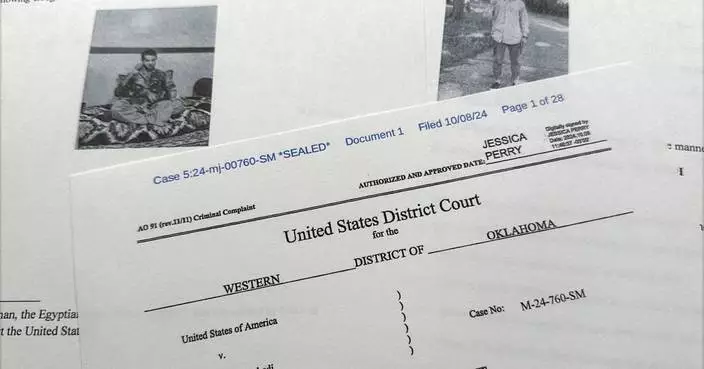
Judge orders Afghan man accused of planning Election Day attack in US to remain in custody
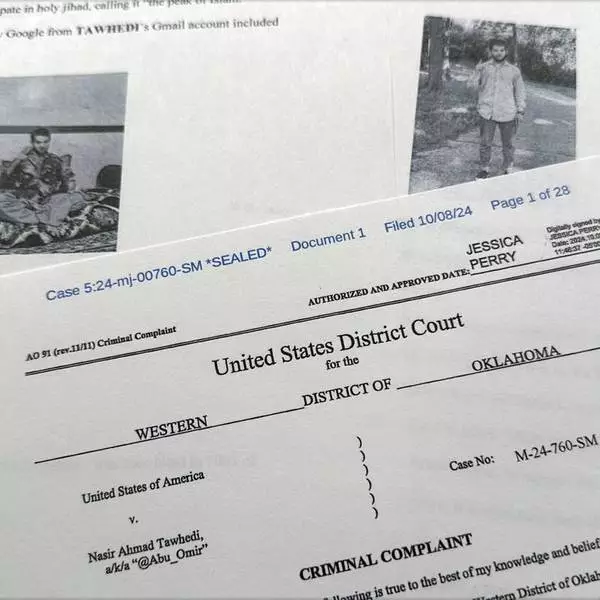
Judge orders Afghan man accused of planning Election Day attack in US to remain in custody
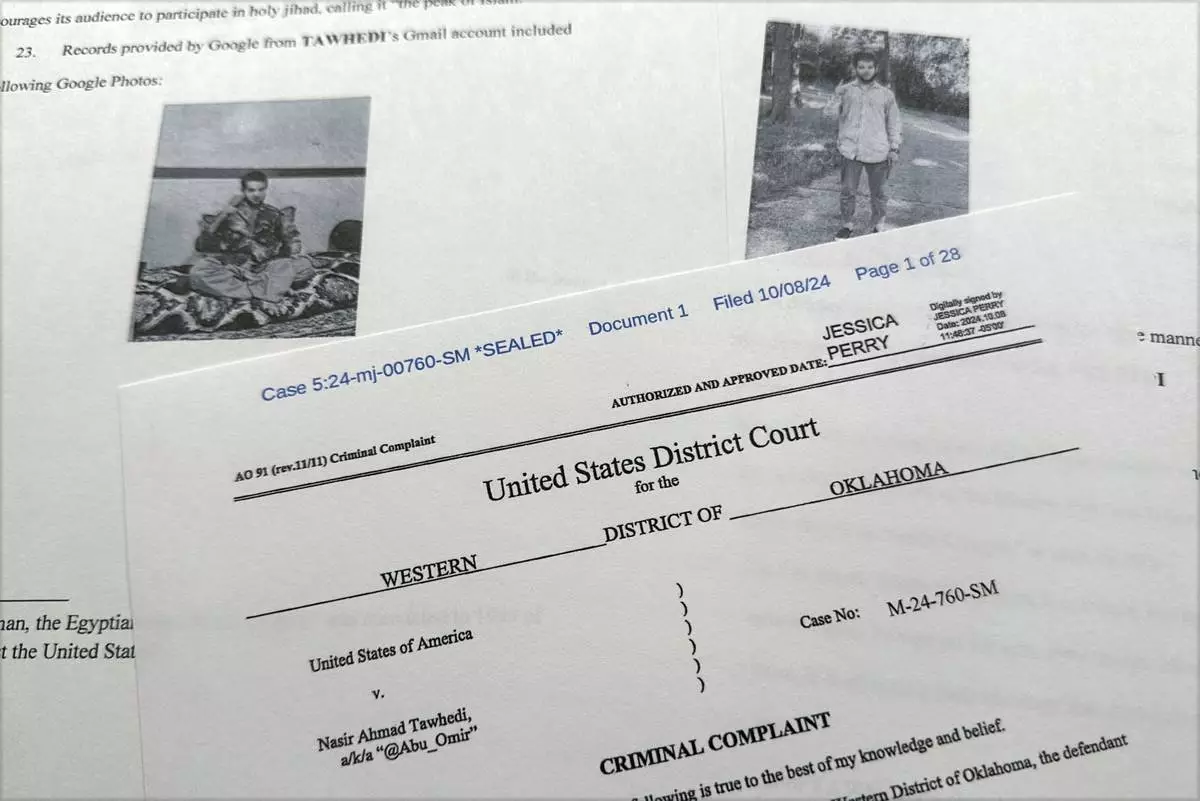
The criminal complaint, filed by the Justice Department, against Nasir Ahmad Tawhedi, 27,of Oklahoma City is photographed Tuesday, Oct. 8, after the FBI arrested the man who officials say was inspired by the Islamic State militant organization and was plotting an Election Day attack targeting large crowds in the U.S. (AP Photo/Jon Elswick)
BEIRUT (AP) — Yahya Sinwar masterminded an attack on Israel that shocked the world, unleashing a still-widening catastrophe with no end in sight.
In Gaza, no figure loomed larger in determining the war’s trajectory than the 61-year-old Hamas leader. Obsessive, disciplined and dictatorial, he was a rarely seen veteran militant who learned Hebrew over years spent in Israeli prisons and who carefully studied his enemy.
On Thursday, Israel said troops in Gaza had killed Sinwar. There was no immediate confirmation from Hamas of his death.
The secretive figure feared on both sides of the battle lines engineered the surprise Oct. 7, 2023, attack into southern Israel, along with the even more shadowy Mohammed Deif, head of Hamas’ armed wing. Israel said that it killed Deif in a July airstrike in southern Gaza that killed more than 70 Palestinians.
Soon after, Hamas’ leader in exile, Ismail Haniyeh, was killed while visiting Iran in an explosion that was blamed on Israel. Sinwar was then chosen to take his place as Hamas’ top leader, though he was in hiding in Gaza.
Palestinian militants who carried out the October 2023 attack killed around 1,200 people, mostly civilians, and abducted around 250 others, catching Israel’s military and intelligence establishment off guard and shattering the image of Israeli invincibility.
Israel’s retaliation was crushing. The conflict has killed over 42,000 Palestinians, caused widespread destruction in Gaza, and left hundreds of thousands of people homeless and many on the verge of starvation.
Sinwar has held indirect negotiations with Israel to try to end the war. One of his goals was to win the release of thousands of Palestinians held in Israeli jails, much like the deal that got him released more than a decade ago.
He worked on bringing Hamas closer to Iran and its other allies across the region. The war he ignited drew in Hezbollah, eventually leading to another Israeli invasion of Lebanon, and led Iran and Israel to trade fire directly for the first time, raising fears of an even more expansive conflict.
To Israelis, Sinwar was a nightmarish figure. The Israeli army’s chief spokesperson, Rear Adm. Daniel Hagari, called him a murderer “who proved to the whole world that Hamas is worse than ISIS,” referring to the Islamic State group.
Always defiant, Sinwar ended one of his few public speeches by inviting Israel to assassinate him, proclaiming in Gaza, “I will walk back home after this meeting.” He then did so, shaking hands and taking selfies with people in the streets.
Among Palestinians, he was respected for standing up to Israel and remaining in impoverished Gaza, in contrast to other Hamas leaders living more comfortably abroad.
But he was also deeply feared for his iron grip in Gaza, where public dissent is suppressed.
In contrast to the media-friendly personas cultivated by some of Hamas’ political leadership, Sinwar never sought to build a public image. He was known as the “Butcher of Khan Younis” for his brutal approach to Palestinians suspected of collaborating with Israel.
Sinwar was born in 1962 in Gaza’s Khan Younis refugee camp to a family that was among hundreds of thousands of Palestinians driven from what is now Israel during the 1948 war surrounding its creation.
He was an early member of Hamas, which emerged from the Palestinian branch of the Muslim Brotherhood in 1987, when the coastal enclave was under Israeli military occupation.
Sinwar convinced the group’s founder, Sheikh Ahmed Yassin, that to succeed as a resistance organization, Hamas needed to be purged of informants for Israel. They founded a security arm, then known as Majd, which Sinwar led.
Arrested by Israel in the late 1980s, he admitted under interrogation to having killed 12 suspected collaborators. He was eventually sentenced to four life terms for offenses that included the abduction and killing of two Israeli soldiers.
Michael Koubi, a former director of the investigations department at Israel’s Shin Bet security agency who interrogated Sinwar, recalled the confession that stood out to him the most: Sinwar recounted forcing a man to bury his own brother alive because he was suspected of working for Israel.
“His eyes were full of happiness when he told us this story,” Koubi said.
But to fellow prisoners, Sinwar was charismatic, sociable and shrewd, open to detainees from all political factions.
He became the leader of the hundreds of imprisoned Hamas members. He organized strikes to improve conditions. He learned Hebrew and studied Israeli society. He was known for feeding fellow inmates, making kunafa, a treat of shredded dough stuffed with cheese.
“Being a leader inside prison gave him experience in negotiations and dialogue, and he understood the mentality of the enemy and how to affect it,” said Anwar Yassine, a Lebanese citizen who spent about 17 years in Israeli jails, much of the time with Sinwar.
Yassine noted how Sinwar always treated him with respect even though he belonged to the Lebanese Communist Party, whose secular principles conflicted with Hamas’ ideology.
During his years in detention, Sinwar wrote a 240-page novel, “Thistle and the Cloves.” It tells the story of Palestinian society from the 1967 Mideast war until 2000, when the second intifada began.
“This is not my personal story, nor is it the story of a specific person, despite the fact that all the incidents are true,” Sinwar wrote in the novel’s opening.
In 2008, Sinwar survived an aggressive form of brain cancer after treatment at a Tel Aviv hospital.
Prime Minister Benjamin Netanyahu released him in 2011 along with about 1,000 other prisoners in exchange for Gilad Schalit, an Israeli soldier captured by Hamas in a cross-border raid. Netanyahu was harshly criticized for releasing dozens of prisoners held for involvement in deadly attacks.
Back in Gaza, Sinwar closely coordinated between Hamas’ political leadership and its military wing, the Qassam Brigades. He also cultivated a reputation for ruthlessness. He is widely believed to be behind the unprecedented 2016 killing of another top Hamas commander, Mahmoud Ishtewi, in an internal power struggle.
He also married after his release.
In 2017, he was elected head of Hamas’ political bureau in Gaza. Sinwar worked with Haniyeh to realign the group with Iran and its allies, including Lebanon’s Hezbollah. He also focused on building Hamas’ military power.
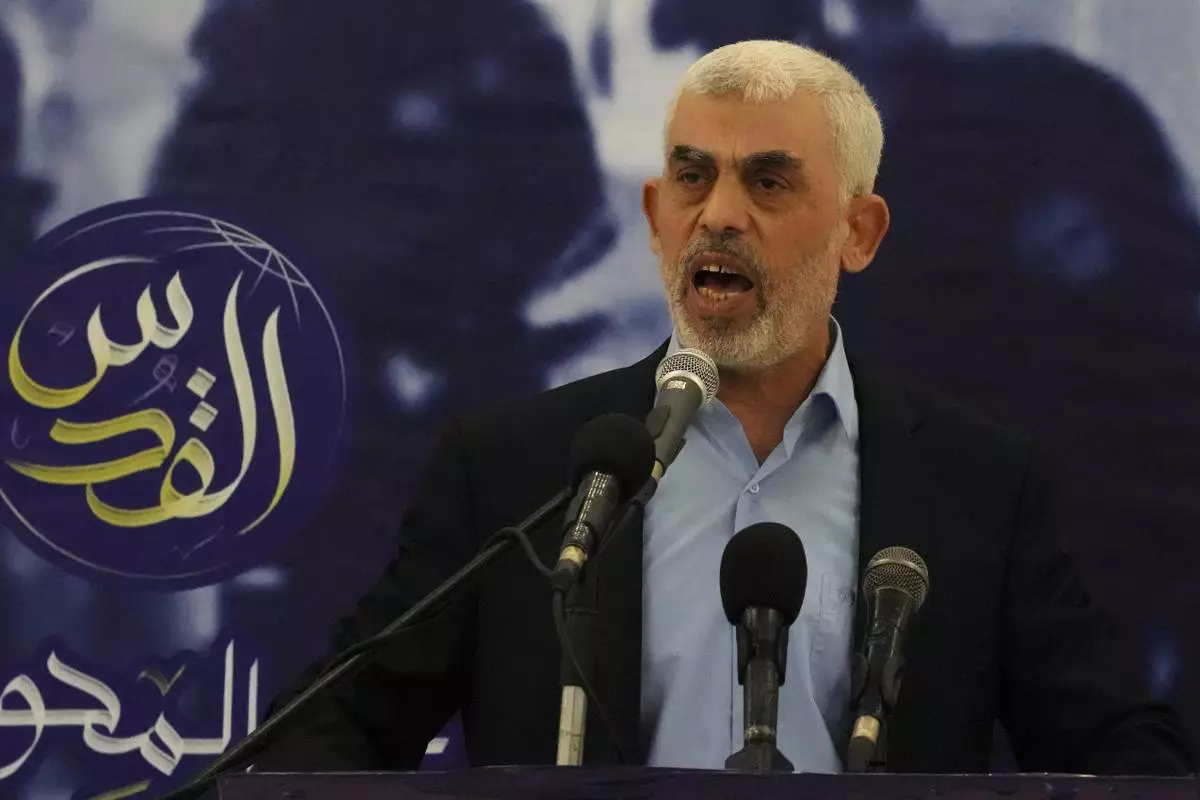
FILE - Yahya Sinwar, head of Hamas in Gaza, delivers a speech during at a hall on the seaside of Gaza City, on April 30, 2022. (AP Photo/Adel Hana)
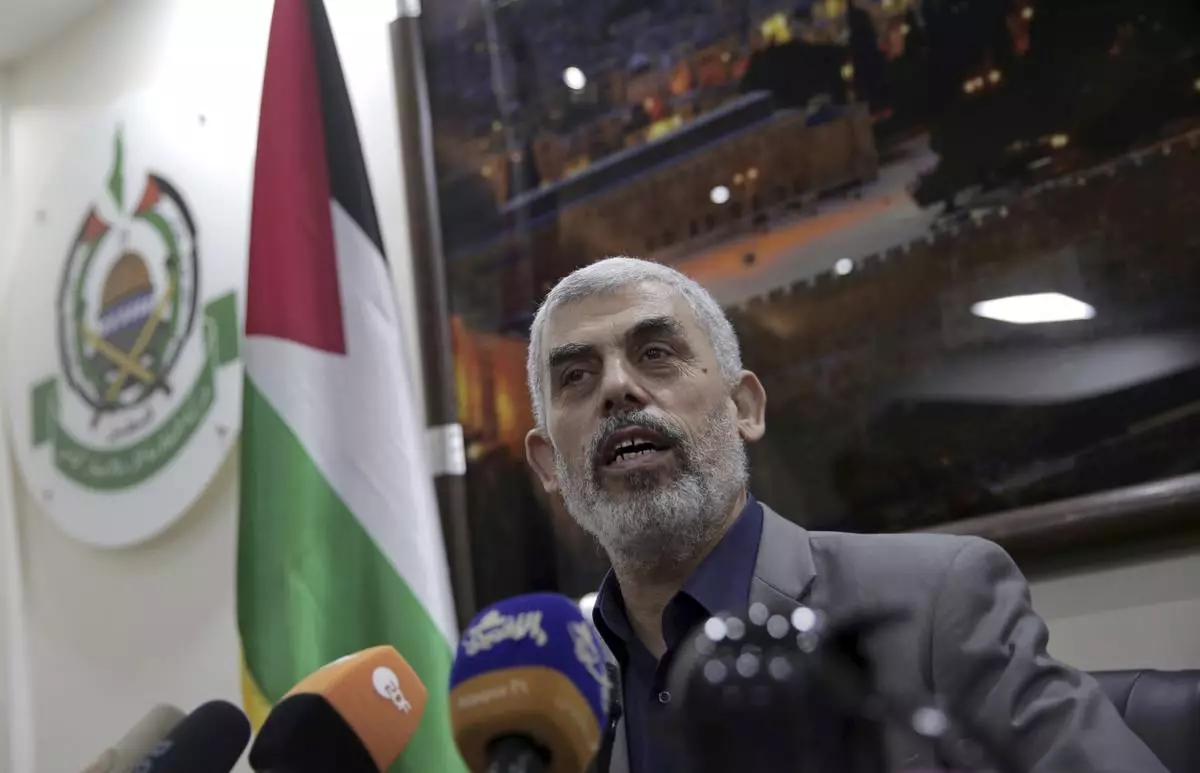
FILE - Yahya Sinwar speaks to foreign correspondents in his office in Gaza City on May 10, 2018. (AP Photo/Khalil Hamra, File)
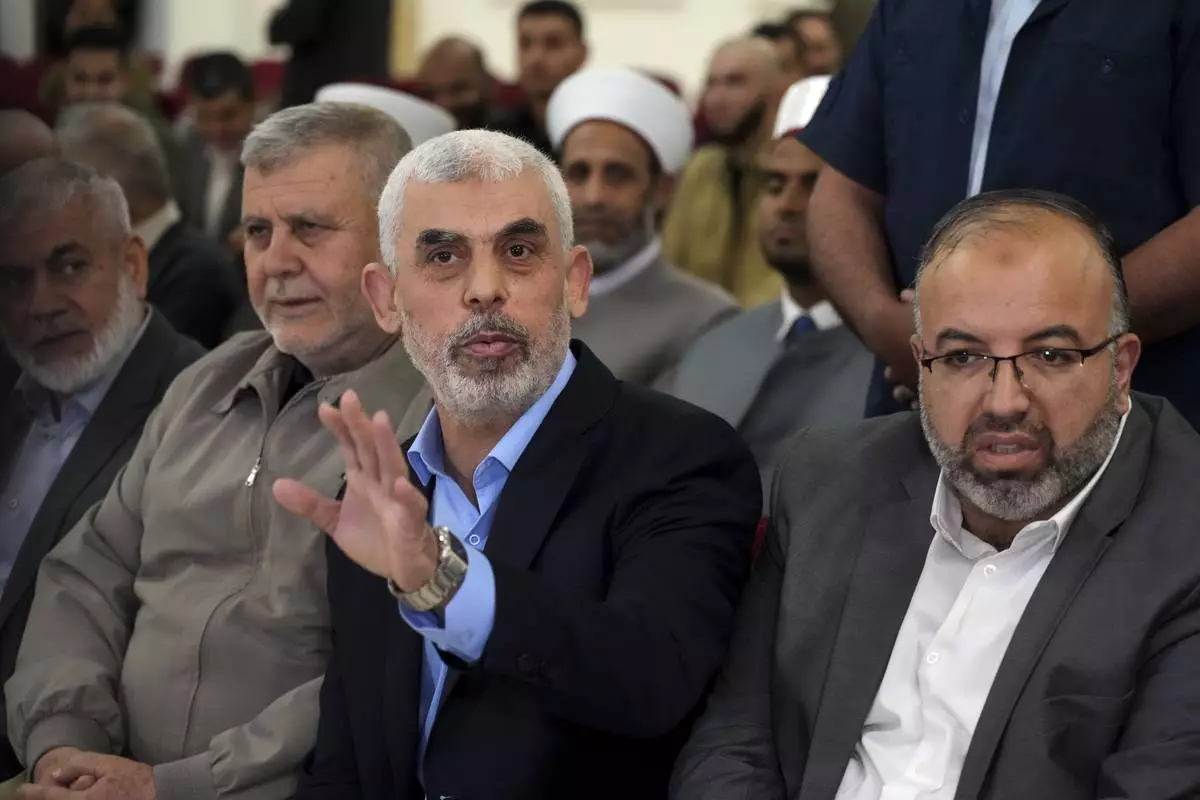
FILE - Yahya Sinwar, head of Hamas in Gaza, greets his supporters upon his arrival at a meeting on the seaside of Gaza City, on April 30, 2022. (AP Photo/Adel Hana, File)
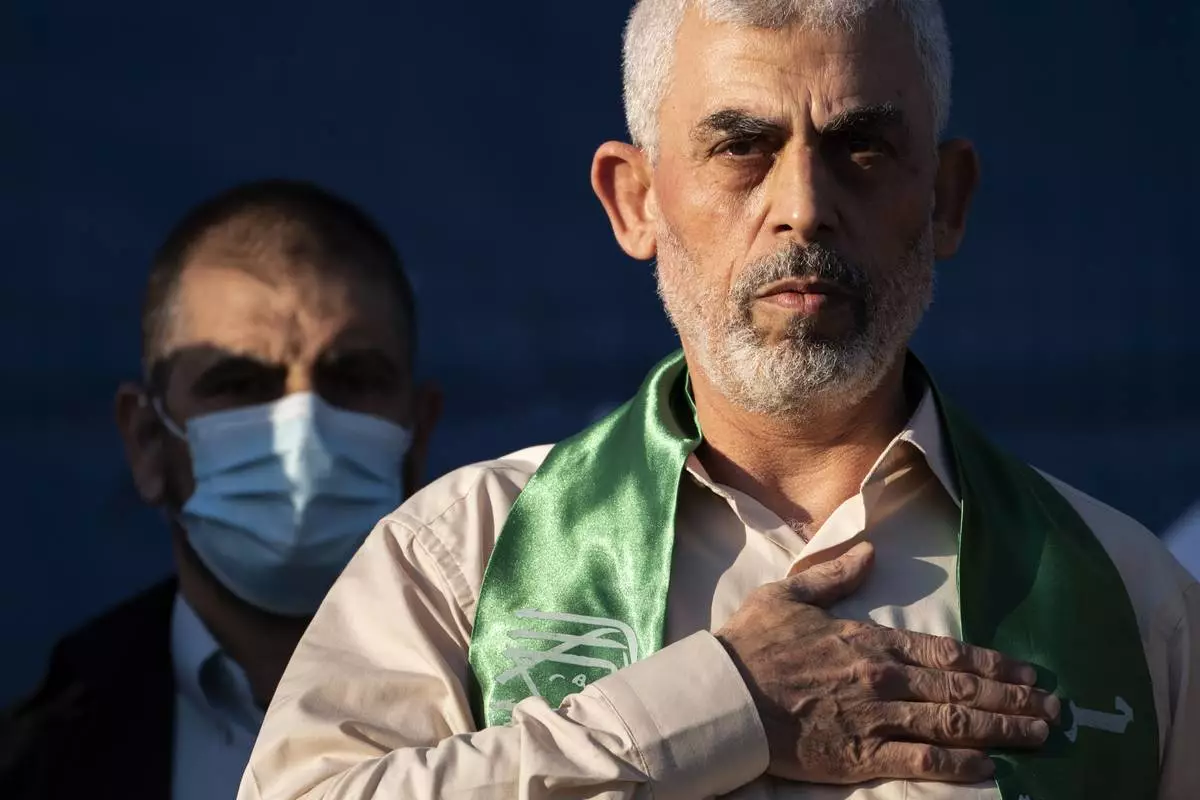
FILE - Yahya Sinwar, Palestinian leader of Hamas in the Gaza Strip, places his hand over his heart on stage after greeting supporters at a rally on May 24, 2021, in Gaza City, the Gaza Strip. (AP Photo/John Minchillo, File)
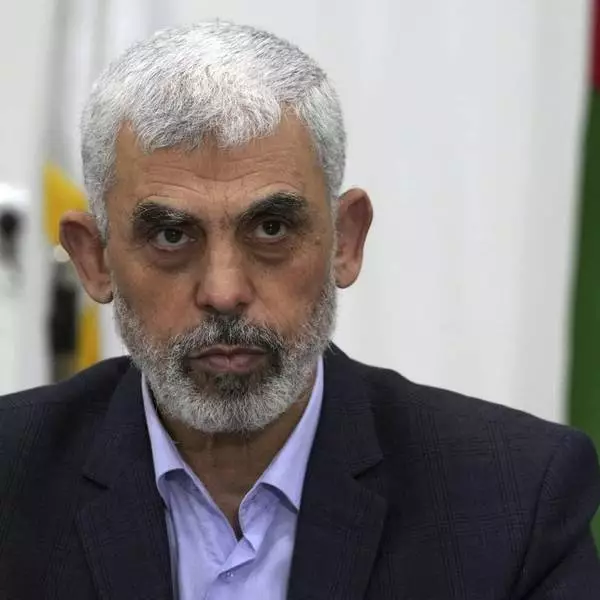
Who is Hamas leader Yahya Sinwar?
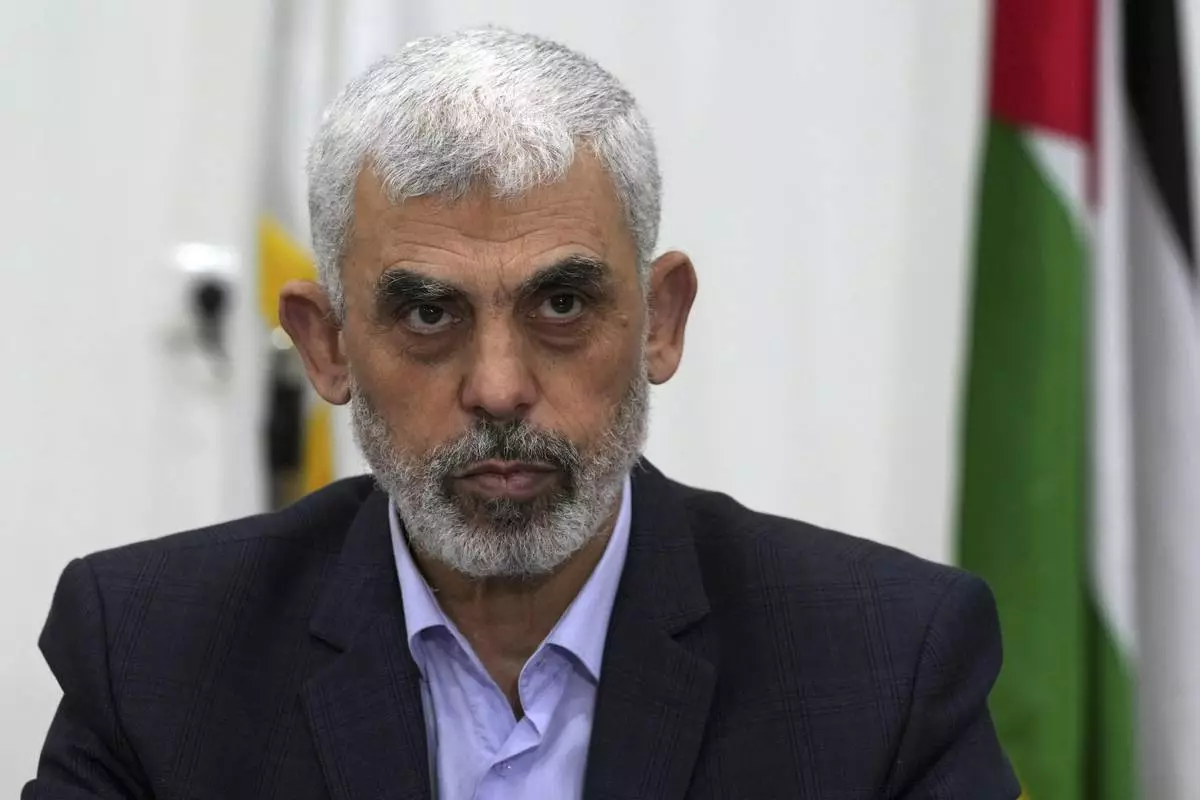
FILE - Yahya Sinwar, head of Hamas in Gaza, chairs a meeting with leaders of Palestinian factions at his office in Gaza City, on April 13, 2022. (AP Photo/Adel Hana, File)
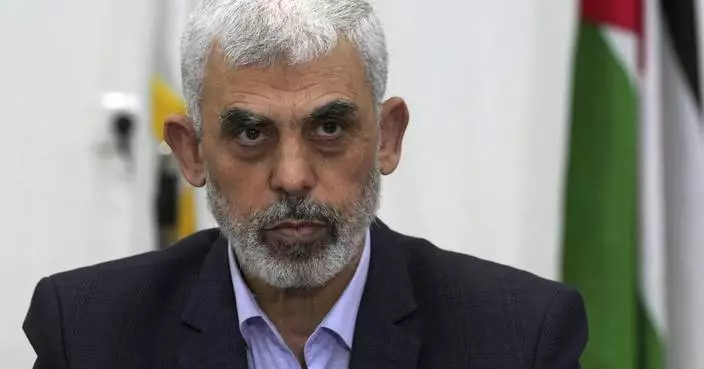
Who is Hamas leader Yahya Sinwar?













